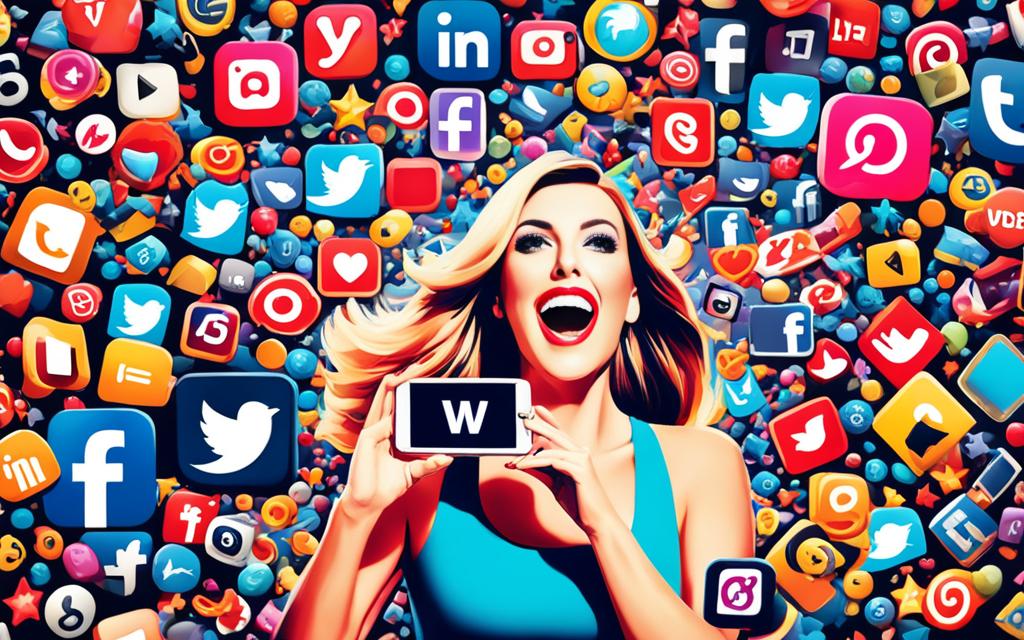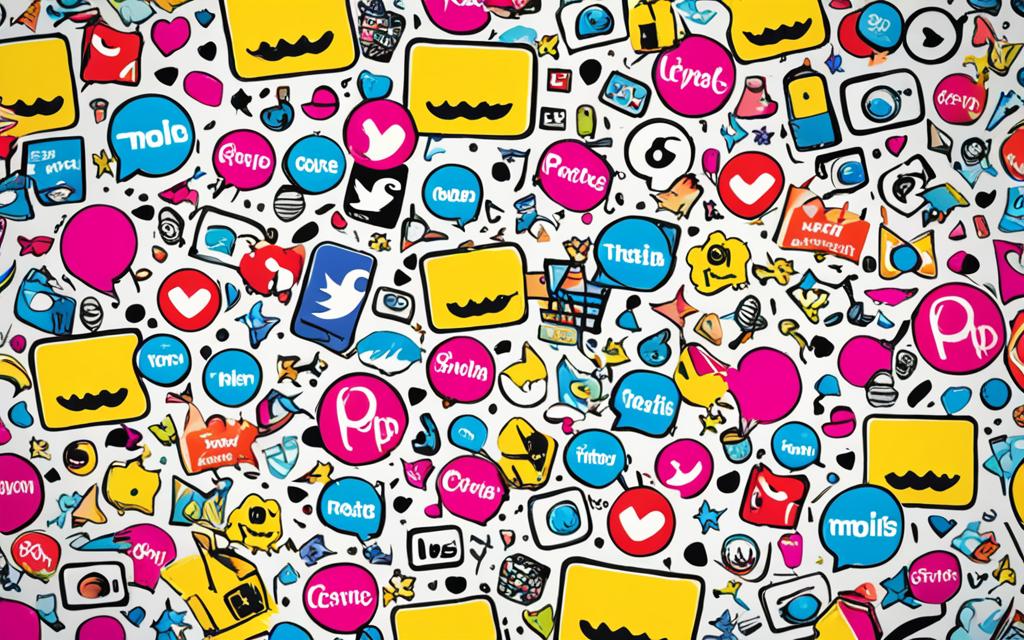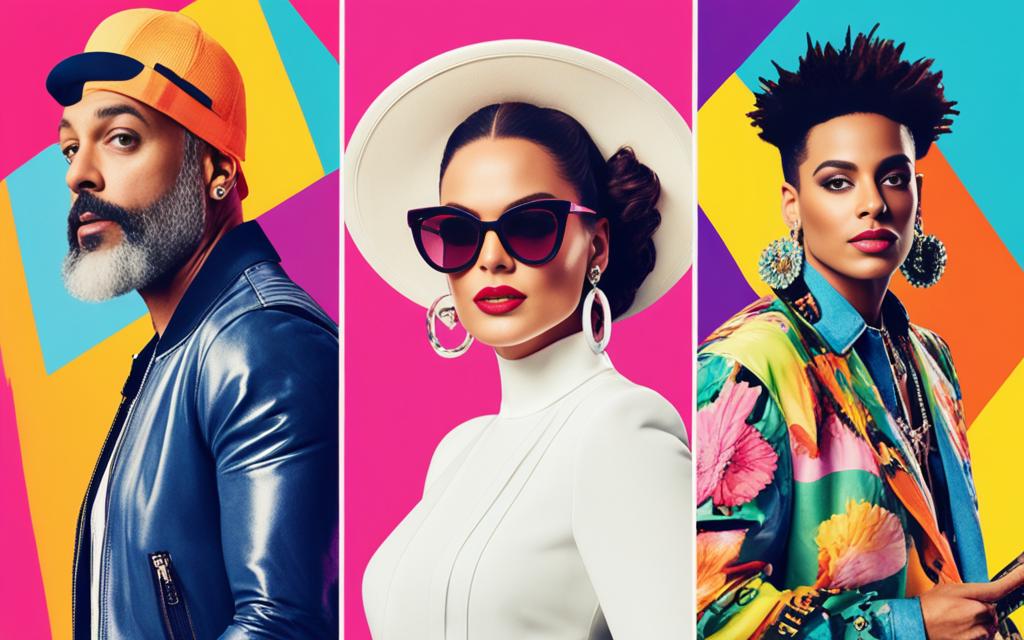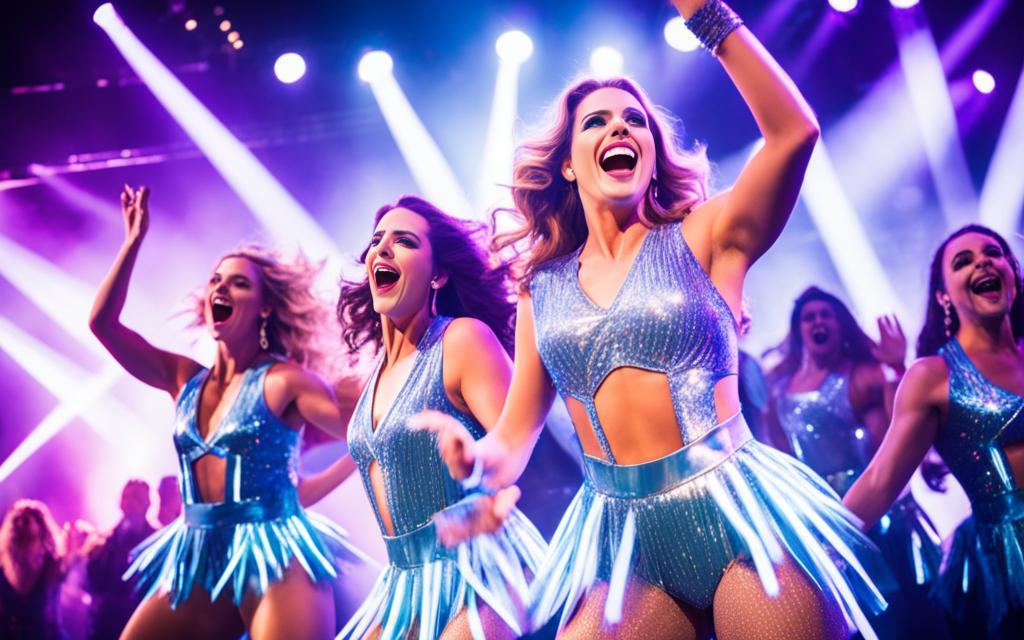In today’s fast-paced and technology-driven world, the entertainment industry, or what we commonly refer to as showbiz, is constantly evolving to keep up with the changing times. Showcasing its ability to adapt, the digital age has presented new opportunities and challenges for the world of entertainment.
This section will delve into the ways in which showbiz is embracing the digital revolution to meet the needs and preferences of modern-day audiences. From streaming platforms to social media and virtual reality, we will explore how technology has revolutionized the entertainment landscape.
With the rise of streaming platforms, traditional forms of media consumption are shifting dramatically. Audiences now have access to a vast library of content at their fingertips, transcending the limitations of traditional broadcast schedules. As a result, the entertainment industry has witnessed a surge in original programming, providing viewers with a diverse range of options that cater to their individual tastes.
Moreover, social media has become an integral component of showbiz. Celebrities and content creators utilize these platforms to engage with their fans, share behind-the-scenes glimpses, and generate buzz around upcoming projects. The power of social media has revolutionized the way we interact with entertainment, creating an immersive and interactive experience.
The integration of virtual reality into showbiz further enhances the audience’s engagement. By putting viewers right in the heart of the action, virtual reality experiences allow for a more immersive and personalized entertainment experience. From virtual concerts to interactive gaming, virtual reality is redefining the boundaries of showbiz.
Looking ahead, the future of digital entertainment holds even more exciting possibilities. Artificial intelligence, augmented reality, and personalized recommendations are just a few of the trends that showbiz is exploring to captivate audiences in the digital age.
As showbiz continues to adapt to the digital age, it remains at the forefront of innovation, constantly pushing boundaries to provide unforgettable entertainment experiences. Join us as we delve deeper into the various aspects of showbiz’s digital transformation and discover what the future holds for this ever-evolving industry.
The Rise of Streaming Platforms
The rise of streaming platforms has revolutionized the way we consume content, ushering in a new era in the entertainment industry. With the advent of platforms like Netflix, Hulu, and Amazon Prime Video, traditional media channels are facing unprecedented challenges.
The convenience and accessibility offered by streaming platforms have led to significant changes in content consumption habits. Gone are the days of waiting for a specific time slot to watch your favorite shows or movies. Streaming platforms provide on-demand access to a vast library of content, allowing you to watch what you want, when you want it.
Streaming platforms have also transformed the way content is produced and distributed. The rise of streaming services has led to an increase in original programming, with platforms investing heavily in creating exclusive content to attract and retain subscribers. This has opened up new opportunities for content creators and actors to showcase their work beyond the traditional studio system.
One of the key advantages of streaming platforms is the ability to personalize the viewing experience. They use recommendation algorithms to analyze your viewing habits and preferences, suggesting content that aligns with your interests. This level of personalization enhances the overall user experience and ensures that you discover new shows and movies that you might have otherwise missed.
“Streaming platforms have become the go-to source for entertainment, offering a vast array of content at your fingertips.”
Moreover, streaming platforms have facilitated the rise of cord-cutting, with many viewers opting to cancel their cable or satellite subscriptions in favor of streaming services. This shift in consumer behavior has forced traditional media channels to adapt and find new ways to engage with their audience.
The rise of streaming platforms has transformed the entertainment landscape, creating a more personalized and flexible viewing experience for consumers. As streaming continues to dominate the industry, it will be interesting to see how traditional media channels adapt and navigate these changing tides.
Social Media’s Role in Entertainment
In today’s digital age, social media plays a crucial role in the entertainment industry. From promoting movies and music to engaging with fans, celebrities and influencers have harnessed the power of these platforms to enhance their presence and reach a wider audience.
One of the key ways social media has transformed the showbiz landscape is through the rise of celebrity influencers. These individuals leverage their massive social media followings to endorse brands, showcase products, and influence consumer behavior. By partnering with these influencers, entertainment companies can tap into their vast reach and credibility, effectively utilizing digital marketing strategies to promote their content.
According to a recent study, over 70% of consumers are more likely to make a purchase based on a social media recommendation from their favorite celebrity or influencer. This is a testament to the immense influence these individuals have on consumer behavior and their ability to shape trends in the entertainment industry.
Social media platforms also provide a direct line of communication between celebrities and their fans. Through interactive features such as live streams, Q&A sessions, and behind-the-scenes glimpses, artists can forge a deeper connection with their audience, fostering loyalty and engagement. This not only enhances the overall entertainment experience but also serves as a valuable tool for market research and feedback.
Furthermore, digital marketing strategies have enabled entertainment companies to target specific demographics with precision. By analyzing user data and engagement metrics, marketers can tailor their promotional campaigns to reach the right audience at the right time. This level of customization ensures that the content is delivered to those who are most likely to engage with and appreciate it.
In conclusion, social media’s role in entertainment cannot be underestimated. It has revolutionized the way celebrities and influencers promote themselves, enabled direct communication with fans, and facilitated targeted digital marketing strategies. As the industry continues to evolve, it is essential for showbiz professionals to adapt to these platforms and harness their power effectively.
Virtual Reality and Showbiz
Virtual Reality (VR) technology has made a significant impact on the world of showbiz, revolutionizing the way films are produced, distributed, and experienced. As technology continues to advance, the integration of VR in the entertainment industry has opened up new possibilities for immersive storytelling and enhanced audience engagement.
One of the key areas where VR has made a profound impact is in film production. With VR tools and techniques, filmmakers can create virtual sets, environments, and special effects, reducing the need for physical sets and props. This not only saves time and resources but also allows for greater creative freedom, enabling filmmakers to bring their visions to life in ways that were previously unimaginable.
Moreover, VR has transformed the way movies are distributed and experienced. Virtual reality headsets provide viewers with a truly immersive and interactive cinematic experience, transporting them into the world of the film. Audiences can now explore virtual environments, interact with characters, and even influence the storyline, blurring the boundaries between the screen and reality.
“Virtual Reality has the potential to redefine the way we consume entertainment and storytelling. It offers an unmatched level of immersion and interactivity that can transport audiences to extraordinary worlds and experiences.”
The impact of VR on showbiz extends beyond film production. The technology has also found its place in other areas of the entertainment industry, such as gaming, live performances, and virtual concerts. VR allows gamers to step into virtual worlds and experience games from a first-person perspective, enhancing the level of engagement and realism. In the realm of live performances, VR enables artists to stage virtual concerts, providing a unique and immersive experience for fans around the world.
As the technology continues to evolve, we can expect to see even more exciting developments in the integration of VR in showbiz. From interactive VR films to virtual reality theme parks, the possibilities are endless. The impact of technology on film production and the entertainment industry as a whole will continue to shape the way we consume and create content.
The Future of Virtual Reality in Showbiz
Looking ahead, virtual reality is poised to play an increasingly significant role in the future of showbiz. Advancements in VR technology, such as 360-degree cameras, haptic feedback systems, and wireless VR headsets, will further enhance the immersive experience for viewers. Additionally, the integration of VR with other emerging technologies like artificial intelligence and blockchain can unlock new opportunities for interactive storytelling and content creation.
With the rapid advancement of VR technology, the impact on film production and the entertainment industry at large is undeniable. Virtual reality has the potential to push the boundaries of creativity, provide unparalleled experiences for audiences, and shape the future of showbiz.
| Impact of Virtual Reality on Showbiz | Benefits |
|---|---|
| Revolutionizes film production | Enables creation of virtual sets and environments, cost and time savings, enhanced creative freedom |
| Transforms film distribution and experience | Immersive and interactive viewing experience, blurs boundaries between screen and reality |
| Expands into gaming and live performances | Enhances engagement and realism, enables virtual concerts and interactive gaming experiences |
| The future of virtual reality in showbiz | Advancements in VR technology, integration with AI and blockchain, limitless possibilities for storytelling and content creation |
Future Trends in Digital Entertainment
In this rapidly evolving digital age, the entertainment industry is constantly adapting to meet the demands of tech-savvy audiences. As we look towards the future, there are several exciting trends emerging in the realm of digital entertainment that have the potential to revolutionize the way we consume media.
Online Film Festivals: Redefining the Movie-Going Experience
One notable trend on the horizon is the rise of online film festivals. These virtual events bring the magic of the silver screen directly to your living room, allowing you to experience the latest independent films and documentaries from the comfort of your own home. Online film festivals not only provide a convenient and accessible platform for filmmakers to showcase their work but also offer a unique opportunity for audiences to engage with diverse content and participate in interactive discussions and Q&A sessions with directors and actors.
By removing geographical barriers and streamlining the film distribution process, online film festivals democratize access to compelling storytelling and pave the way for emerging talents to gain recognition in the industry. The convenience and global reach of these events make them an attractive alternative for both filmmakers and film enthusiasts alike.
Case Studies of Digital Adaptation: Success in the New Age
Another trend shaping the future of digital entertainment is the increasing number of successful case studies of digital adaptation. As traditional entertainment formats and distribution models continue to transform, industry giants and emerging players are finding innovative ways to leverage digital platforms and technologies to their advantage.
“The entertainment industry is undergoing a digital revolution, and it’s crucial for content creators to adapt to changing consumer preferences. Netflix, for instance, disrupted the traditional television landscape and pioneered the subscription streaming model, leading to a paradigm shift in how we consume TV shows and movies.”
Streaming platforms like Netflix, Hulu, and Amazon Prime Video have not only revolutionized content consumption but have also changed the dynamics of content production. Through data-driven insights and personalized recommendations, these platforms have propelled the creation of unique and captivating storytelling, catering to niche audiences and challenging conventional norms. The success of these platforms serves as a testament to the power of digital adaptation and the limitless possibilities it holds for the future of entertainment.
Technological Advancements: Shaping the Entertainment Landscape
Advancements in technology continue to push the boundaries of what is possible in the world of entertainment. From virtual reality to augmented reality, cutting-edge technologies are enhancing immersive experiences and blurring the lines between reality and fiction.
Venturing into virtual reality, for instance, allows users to dive into entirely new worlds, immersing themselves in captivating narratives and interactive gameplays. With the introduction of affordable VR headsets and accessories, this once niche technology is becoming more accessible to the general public, laying the foundation for a new era of storytelling.
| Technological Advancement | Impact on Entertainment |
|---|---|
| Artificial Intelligence | Enhanced content creation, personalized recommendations, and targeted advertising. |
| Blockchain | Transparent royalty distribution, secure digital rights management, and decentralized content platforms. |
| 5G Connectivity | Seamless streaming, real-time interactivity, and enhanced mobile gaming experiences. |
As technology continues to advance and intertwine with entertainment, the future holds immense potential for groundbreaking experiences that will delight and engage audiences like never before.
In conclusion, the future of digital entertainment is bright and filled with exciting opportunities. Online film festivals, successful case studies of digital adaptation, and technological advancements are reshaping the industry, offering new avenues for creators to showcase their talent and audiences to discover compelling content. As we embrace these future trends, it is evident that the digital age has unlocked a world of endless possibilities for the entertainment industry.
Conclusion
In conclusion, Showbiz in the Digital Age is constantly evolving and adapting to the advancements in technology and changing audience demands. The rise of streaming platforms has revolutionized the way we consume entertainment, providing convenient and on-demand access to a vast array of content. Social media has become a powerful tool for promoting and engaging with audiences, allowing celebrities and content creators to connect directly with their fans.
Furthermore, virtual reality has opened up new possibilities for immersive experiences, allowing viewers to step into the world of their favorite movies, shows, and games. Digital marketing strategies have also played a crucial role in the success of showbiz in the digital age, enabling targeted advertising and personalized recommendations.
As technology continues to advance, it will be fascinating to witness the further transformation of entertainment in the digital age. With the integration of artificial intelligence, augmented reality, and other emerging technologies, the showbiz industry has limitless potential for innovation and growth. Showbiz in the Digital Age is an exciting and dynamic landscape that promises to deliver captivating content to audiences around the world.








